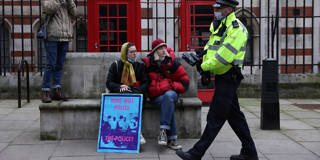The UK’s draconian Public Order Bill, which seeks to restrict certain forms of protest used by climate activists, will expand the state’s ability to detain people deemed disruptive and limit the courts’ ability to restrain it. This will align the British legal system with those of authoritarian countries like Russia.
LONDON – In December 1939, police raided the home of George Orwell, seizing his copy of D.H. Lawrence’s Lady Chatterley’s Lover. In a letter to his publisher after the raid, Orwell wondered whether “ordinary people in countries like England grasp the difference between democracy and despotism well enough to want to defend their liberties.”
Nearly a century later, the United Kingdom’s draconian Public Order Bill, passed by the UK House of Commons last year and now being considered in the House of Lords, vindicates Orwell’s doubt. The bill seeks to restrict the right to protest by extending the scope of criminality, reversing the presumption of innocence in criminal trials, and weakening the “reasonableness” test for coercive action. In other words, it widens the government’s scope for discretionary action while limiting the courts’ ability to restrain it.
When the police seized Orwell’s copy of Lady Chatterley’s Lover, the novel was banned under the Obscene Publications Act of 1857, which prohibited the publication of any material that might “deprave and corrupt” readers. In 1959, the nineteenth-century law was replaced by a more liberal measure that enabled publishers to defend against obscenity charges by showing that the material had artistic merit and that publishing it was in the public interest. Penguin Books succeeded with this defense when it was prosecuted for publishing Lady Chatterley’s Lover in 1960; by the 1980s, the book was taught in public schools.

LONDON – In December 1939, police raided the home of George Orwell, seizing his copy of D.H. Lawrence’s Lady Chatterley’s Lover. In a letter to his publisher after the raid, Orwell wondered whether “ordinary people in countries like England grasp the difference between democracy and despotism well enough to want to defend their liberties.”
Nearly a century later, the United Kingdom’s draconian Public Order Bill, passed by the UK House of Commons last year and now being considered in the House of Lords, vindicates Orwell’s doubt. The bill seeks to restrict the right to protest by extending the scope of criminality, reversing the presumption of innocence in criminal trials, and weakening the “reasonableness” test for coercive action. In other words, it widens the government’s scope for discretionary action while limiting the courts’ ability to restrain it.
When the police seized Orwell’s copy of Lady Chatterley’s Lover, the novel was banned under the Obscene Publications Act of 1857, which prohibited the publication of any material that might “deprave and corrupt” readers. In 1959, the nineteenth-century law was replaced by a more liberal measure that enabled publishers to defend against obscenity charges by showing that the material had artistic merit and that publishing it was in the public interest. Penguin Books succeeded with this defense when it was prosecuted for publishing Lady Chatterley’s Lover in 1960; by the 1980s, the book was taught in public schools.